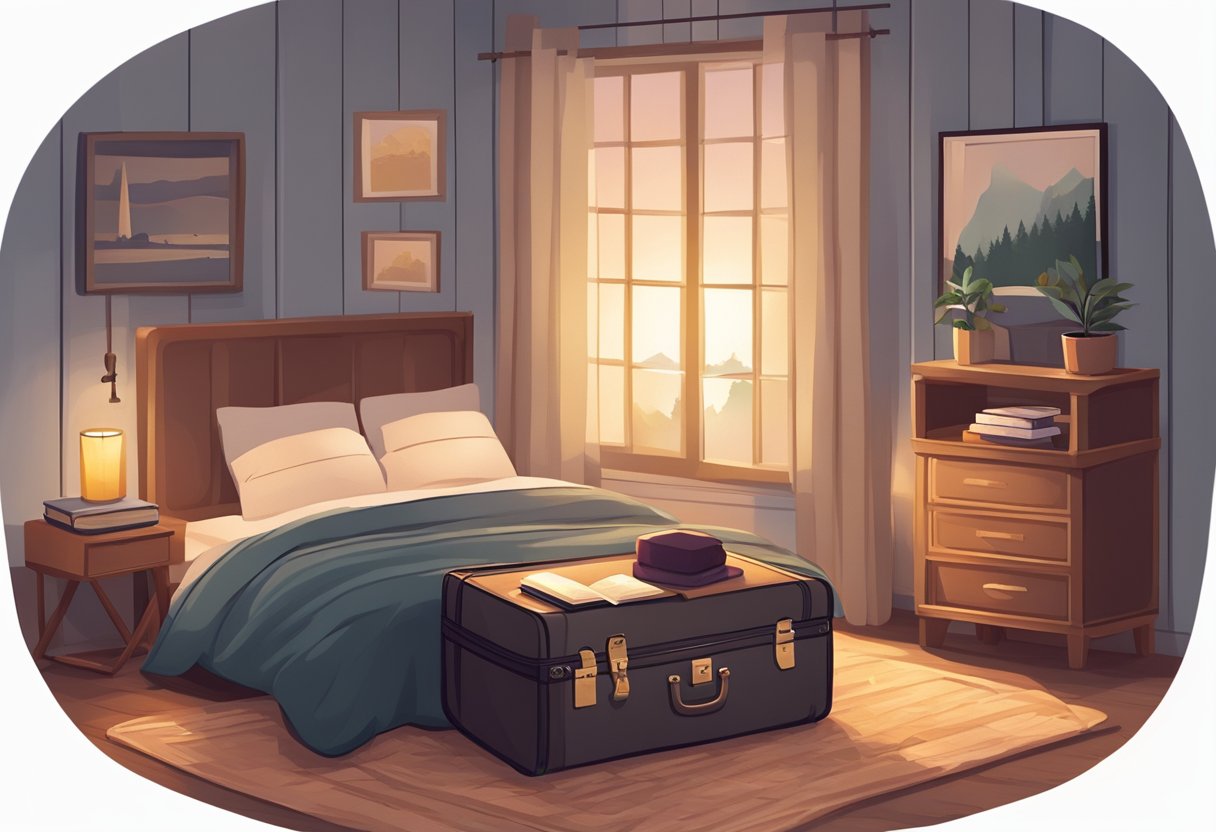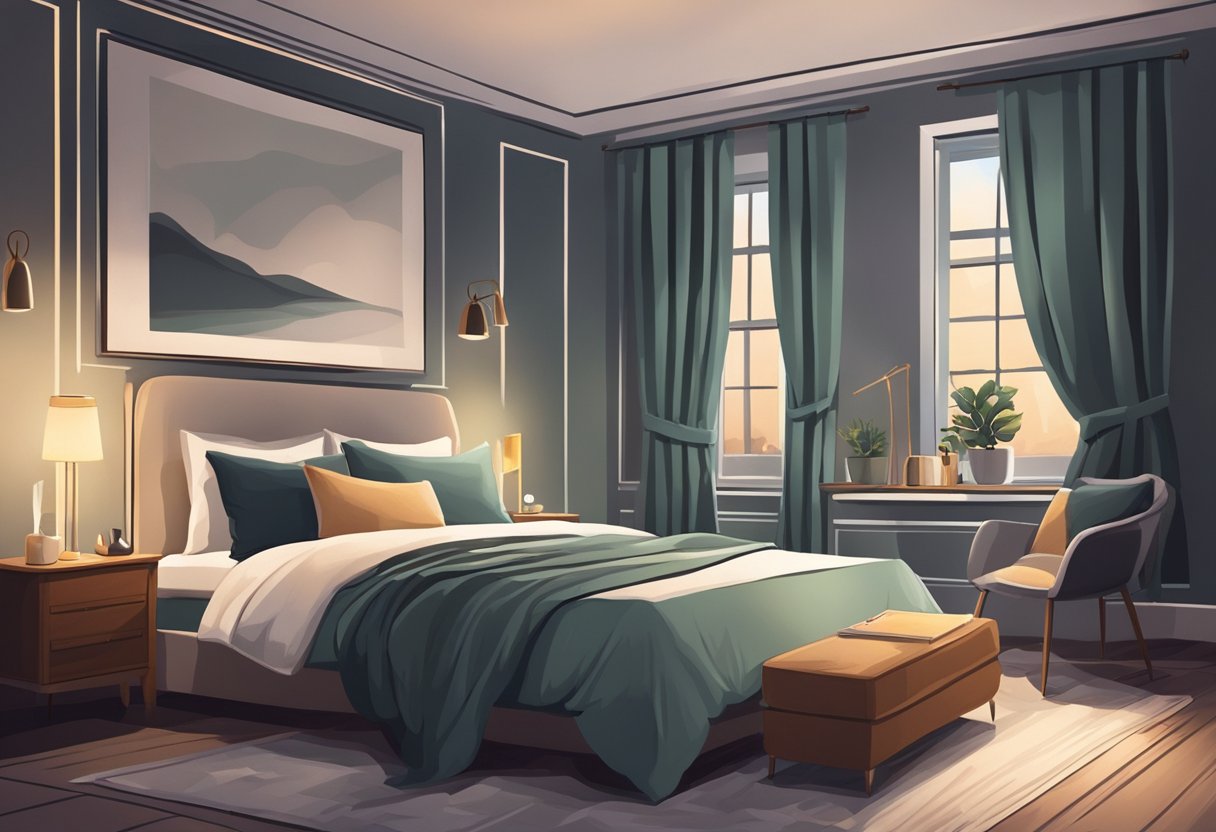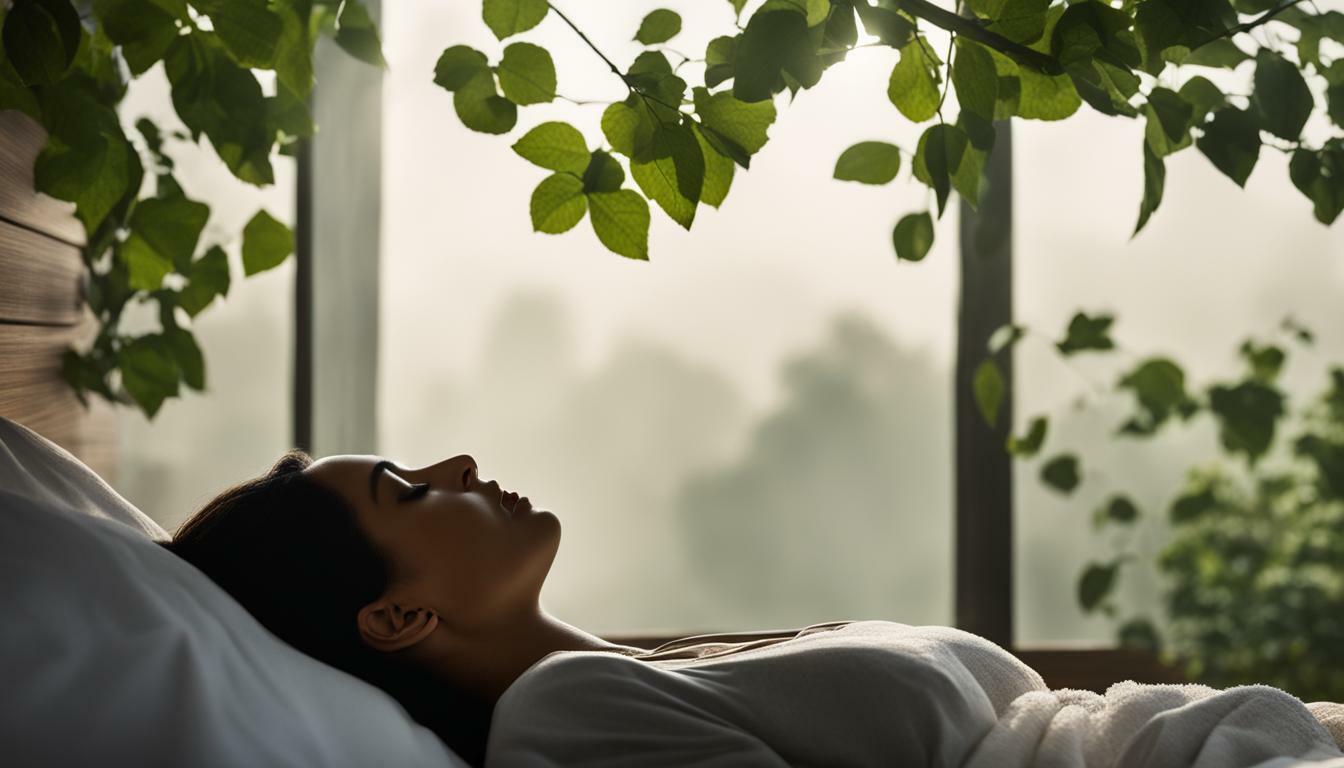When you’re away from home, it can be difficult to get a good night’s sleep. There are many factors that can affect your sleep, including environmental changes and psychological effects. Understanding these factors can help you sleep better when you’re away from home.
Table of Contents
Impact of Environmental Changes on Sleep
The environment of your destination is a major contributor to your sleep. Before traveling, consider the climate and culture of your destination. Is it a cold, quiet mountain town? Or a loud, tropical beach resort? Then, consider how your personal preferences align with your location.
For example, if you’re used to sleeping in a quiet environment, a noisy hotel room may disrupt your sleep. If you’re used to sleeping in a cool environment, a warm hotel room may make it difficult to fall asleep. These environmental changes can affect your sleep-wake cycle and circadian rhythm, which can lead to sleep deprivation and other sleep disorders.

Psychological Effects of Sleeping in a New Place
Psychological factors can also affect your sleep when you’re away from home. Anxiety, stress, and other emotions can make it difficult to fall asleep and stay asleep. These emotions can be caused by a variety of factors, including homesickness, jet lag, and unfamiliar surroundings.
To combat these psychological effects, try to maintain your normal sleep habits as much as possible. Stick to your regular sleep schedule and bedtime routine, and bring familiar items from home to help you feel more comfortable. This can include your favorite pillow, stuffed animal, or even pictures of your family.
Creating a Conducive Sleep Environment

When you’re away from home, creating a comfortable and conducive sleep environment can be challenging. However, with a few simple adjustments, you can ensure that you get a good night’s sleep.
Choosing the Right Bedding and Pillows
One of the most important factors in creating a comfortable sleep environment is choosing the right bedding and pillows. Whether you’re staying in a hotel or with friends or family, it’s important to make sure that you have comfortable and supportive pillows and a mattress that suits your needs. If you have any special requirements, such as a memory foam mattress or hypoallergenic bedding, make sure to communicate these needs in advance.
Another important factor to consider is the quality of the sheets and blankets. Soft, high-quality sheets can make a big difference in your comfort level, and they can help regulate your body temperature throughout the night. Consider bringing your own sheets and blankets if you have specific preferences.
Controlling Room Temperature and Lighting
The temperature and lighting in your bedroom can also have a significant impact on your ability to sleep. If possible, try to adjust the temperature in the room to a comfortable level. A fan or a portable heater can help regulate the temperature if the thermostat is not easily accessible.
Lighting can also be a factor in your ability to sleep. If the room is too bright, consider using blackout curtains or an eye mask to block out the light. On the other hand, if the room is too dark, consider using a night light or leaving the bathroom light on to provide some ambient light.
Adopting a Relaxing Pre-Sleep Routine
To ensure a good night’s sleep when away from home, it’s essential to adopt a relaxing pre-sleep routine. This routine should include a series of activities that help your body and mind unwind, making it easier to fall asleep. Here are some tips to help you relax before bed.
Relaxation Techniques Before Bed
One of the most effective ways to relax before bed is through meditation. Meditation can help calm your mind and reduce stress levels, making it easier to fall asleep. If you’re new to meditation, there are many apps and online resources available to help you get started.
Reading is another great way to relax before bed. Choose a book that’s not too stimulating and read for 15-20 minutes before turning out the lights. This will help your mind unwind and prepare for sleep.
The Role of Showers and Meals in Sleep Quality
Taking a warm shower before bed can also help you relax and improve sleep quality. The warm water can help relax your muscles and reduce tension, making it easier to fall asleep. Additionally, cooling off your room to around 65 degrees Fahrenheit can also help with sleep onset.
Eating a heavy meal before bed can interfere with sleep quality. Instead, opt for a light snack that’s high in protein and low in sugar. This can help stabilize blood sugar levels and prevent waking up hungry in the middle of the night.
Bedtime Routines and Relaxation Exercises
Creating a bedtime routine can also help signal to your brain that it’s time to wind down and prepare for sleep. This routine can include activities such as stretching, deep breathing, or relaxation exercises.
Finally, consider taking a melatonin supplement before bed. Melatonin is a hormone that helps regulate sleep and wake cycles, and can be especially helpful when sleeping in an unfamiliar environment.
By adopting a relaxing pre-sleep routine that includes relaxation techniques, showers, meals, bedtime routines, and melatonin supplements, you can improve your sleep quality and wake up feeling refreshed and energized.
Minimizing Disruptions and Distractions
When you’re away from home, it can be challenging to get a good night’s sleep due to disruptions and distractions. Fortunately, there are ways to minimize these disturbances and improve your sleep quality.
Dealing with Noise and Light Pollution
Noise and light pollution can disrupt your sleep, making it harder to fall asleep and stay asleep. To minimize these disruptions, consider using earplugs and a sleep mask. Earplugs can help block out noise, while a sleep mask can help block out light. If you don’t have a sleep mask, you can use an eye mask or even a scarf to cover your eyes.
If you’re sensitive to noise, consider playing white noise or soothing music to help drown out any disruptive sounds. You can use a white noise machine or a white noise app on your phone or tablet. If you don’t have access to either, you can also try using a fan or air conditioner to create a soothing background noise.
Managing Technology and Electronics
Technology and electronics can also disrupt your sleep, especially if you’re using them right before bedtime. To minimize these disruptions, avoid using electronics such as phones, tablets, and screens at least 30 minutes to an hour before bedtime. The blue light emitted from these devices can interfere with your sleep by suppressing the production of melatonin, a hormone that helps regulate sleep.
If you need to use your phone or tablet before bed, consider using a blue light filter or night mode to reduce the amount of blue light emitted. You can also try using headphones to listen to soothing music or white noise, so you don’t disturb others around you.
Finally, if you’re using your phone as an alarm clock, consider using an actual alarm clock instead. This will allow you to keep your phone in another room, reducing the temptation to check it during the night.
Maintaining Sleep Hygiene While Traveling
When you’re away from home, it can be challenging to maintain your sleep hygiene. However, with a few adjustments, you can still get quality sleep while traveling. Here are some tips to help you maintain your sleep hygiene while on the go.
Adjusting to New Time Zones
Adjusting to a new time zone can be difficult, but it’s essential to get quality sleep. Try to gradually adjust your sleep schedule a few days before your trip to align with your destination’s time zone. Once you arrive, try to get as much sunlight as possible during the day to help reset your body’s internal clock. If you’re still struggling to adjust, consider taking a melatonin supplement to help regulate your sleep-wake cycle.
Staying Active and Mindful of Stimulants
Physical activity can help you sleep better, so try to incorporate some exercise into your travel routine. Take a walk around the city or do some yoga in your hotel room. However, be mindful of stimulants such as caffeine, nicotine, and alcohol, which can disrupt your sleep. Try to limit your intake of these substances, especially in the hours leading up to bedtime.
Here are some additional tips to help you maintain your sleep hygiene while traveling:
- Stick to a regular sleep schedule as much as possible.
- Use a sleep mask and earplugs to block out light and noise.
- Bring your own pillow or blanket to make your sleeping environment more comfortable.
- Avoid using electronic devices in bed, as the blue light can interfere with your sleep.
- Choose a hotel room that is quiet and away from the elevator and ice machine.
Leveraging Sleep Aids and Supplements
When you’re away from home, it can be difficult to fall asleep, especially if you’re not used to sleeping in a new environment. However, there are a few sleep aids and supplements that you can use to help you sleep better.
Natural Supplements for Better Sleep
Melatonin is a hormone that regulates sleep, and taking melatonin supplements can help you fall asleep faster and improve the quality of your sleep. It’s important to note that melatonin supplements can interact with certain medications, so it’s best to consult with your doctor before taking them.
Valerian root is an herb that has been used for centuries as a natural sleep aid. It’s believed to help calm the nervous system and promote relaxation, making it easier to fall asleep. However, more research is needed to fully understand its effectiveness and potential side effects.
Chamomile is another herb that is commonly used as a natural sleep aid. It’s believed to have flavonoids that interact with benzodiazepine receptors in the brain, which are involved in the sleep-wake transition. Chamomile tea is a popular way to consume this herb, and it’s caffeine-free, unlike green tea or Earl Grey.
Lavender is a fragrant herb that is often used in aromatherapy to promote relaxation and reduce stress. It’s believed to have sedative effects, which can help you fall asleep faster and improve the quality of your sleep. You can use lavender essential oil in a diffuser or apply it to your skin before bed.
Portable Comfort Items for Familiarity
One of the reasons why it can be difficult to sleep away from home is because you’re not used to the environment. Bringing along a few portable comfort items can help create a sense of familiarity and make it easier to fall asleep.
A travel pillow can provide support and comfort for your neck and head, especially if you’re traveling by plane or car. Bringing along your favorite pillow from home can also help create a familiar sleeping environment.
If you’re used to sleeping with a stuffed animal or other comforting item, consider bringing it along with you. Having something familiar to hold onto can help reduce anxiety and promote relaxation.
Frequently Asked Questions
What strategies can alleviate anxiety when trying to sleep in a new environment?
Anxiety can be a significant barrier to getting a good night’s sleep in an unfamiliar place. Some strategies that can help alleviate anxiety include creating a relaxing bedtime routine, bringing familiar items from home, such as a pillow or blanket, and practicing relaxation techniques like deep breathing or meditation.
What causes the “first night effect” and how can it be minimized?
The “first night effect” is a phenomenon where people tend to have difficulty sleeping during their first night in a new environment. This is thought to be due to the brain’s natural tendency to remain alert in unfamiliar surroundings. To minimize the “first night effect,” it can be helpful to arrive at your destination early in the day to allow your body time to adjust, and to stick to your normal bedtime routine as much as possible.
How can adults overcome the fear of sleeping away from their own home?
The fear of sleeping away from home, also known as “away from home” anxiety, can be challenging to overcome. Some strategies that can help include gradually exposing yourself to new environments, practicing relaxation techniques, and seeking support from a therapist or counselor.
What techniques can help someone fall asleep quickly in an unfamiliar place?
Some techniques that can help someone fall asleep quickly in an unfamiliar place include creating a dark and quiet sleeping environment, using earplugs or white noise to block out external sounds, and avoiding stimulating activities like watching TV or using electronic devices in the bedroom.
Are there ways to adapt to sleeping in different locations more easily?
Yes, there are several ways to adapt to sleeping in different locations more easily. These include sticking to a consistent sleep schedule, creating a relaxing bedtime routine, and bringing familiar items from home, such as a pillow or blanket.
What factors contribute to some people sleeping better in unfamiliar beds?
Some people may find that they sleep better in unfamiliar beds due to the novelty of the experience. Additionally, the lack of familiar distractions or stressors in a new environment can sometimes lead to a more restful night’s sleep. However, it is important to note that everyone’s sleep preferences and needs are different, and what works for one person may not work for another.


